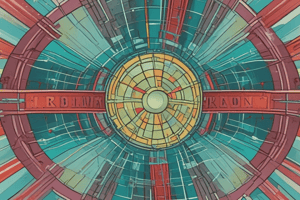Podcast
Questions and Answers
Which of the following cannot be found in prokaryotes?
Which of the following cannot be found in prokaryotes?
- Cytoplasm
- Plasma membrane
- Membrane-bound nucleus (correct)
- DNA
Which region of a vertebrate forebrain is associated with the neutral-endocrine control of visceral activities?
Which region of a vertebrate forebrain is associated with the neutral-endocrine control of visceral activities?
- Thalamus
- Pituitary
- Hypothalamus (correct)
- Cerebellum
What is the building block of carbohydrates?
What is the building block of carbohydrates?
- Amino acid
- Nucleotide
- Monosaccharide (correct)
- Fatty acid
Which of the following organelles produces turbo pressure against the cell wall and mainly acts as a water reservoir?
Which of the following organelles produces turbo pressure against the cell wall and mainly acts as a water reservoir?
What is the branch of zoology that is devoted to the study of fish?
What is the branch of zoology that is devoted to the study of fish?
What term is used to describe the ability to maintain a constant internal environment?
What term is used to describe the ability to maintain a constant internal environment?
Why do men have more red blood cells per cubic millimeter of blood than women?
Why do men have more red blood cells per cubic millimeter of blood than women?
Where does protein synthesis take place?
Where does protein synthesis take place?
What is the most common cause of cardiovascular disease?
What is the most common cause of cardiovascular disease?
Why are our lips 'redder' than our palms?
Why are our lips 'redder' than our palms?
Flashcards are hidden until you start studying
Study Notes
Blood and Energy
- Producers derive energy primarily from the sun.
- Men typically have more red blood cells per cubic millimeter due to greater physical demands and larger body size.
- Red blood cells are crucial for transporting oxygen and managing physical exertion.
Vision and Adaptation
- Transitioning from dark to light can cause temporary vision issues due to pupil adjustments.
Homeostasis and Health
- Homeostasis refers to the ability to maintain a stable internal environment.
- Cardiovascular diseases are often caused by fatty deposits in arteries.
Cellular Biology
- The basic unit of life that can survive and reproduce independently is the cell.
- Ribosomes are the sites of protein synthesis, crucial for cellular function.
- The smallest carbohydrate building block is monosaccharide.
Genetics and Zoology
- Gene expression involves transcription, where mRNA is synthesized from DNA.
- Ichthyology is the branch of zoology focused on the study of fish.
Plant Biology
- The cell wall of plants is primarily made from cellulose.
- The most abundant inorganic compound in protoplasm is water.
Environmental Science
- The richest type of tropical rain forest in the Philippines is the dipterocarp forest.
Musculature and Symmetry
- Smooth muscle is involuntary, non-striated, and generally contains a single nucleus.
- Bilateral symmetry is characterized by paired body parts on either side of the organism.
Photosynthesis and Respiratory Processes
- The product formed during the dark reaction of photosynthesis is PGAL, a 3-carbon sugar.
- The enzyme ptyalin in saliva helps break down starch into maltose.
Movement of Water in Plants
- The upward movement of water in tall trees is primarily due to transpiration, which creates a negative pressure.
Organ Systems
- The epiglottis prevents food from entering the trachea during swallowing.
- The medulla oblongata acts as the respiratory center of the brain.
Incomplete Metamorphism
- Grasshoppers undergo nymph and adult stages in their incomplete metamorphosis development.
Studying That Suits You
Use AI to generate personalized quizzes and flashcards to suit your learning preferences.




